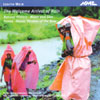Weir (The) Welcome Arrival of Rain
Weir paints some arresting images in these revelatory orchestral works
View record and artist detailsRecord and Artist Details
Composer or Director: Judith Weir
Label: NMC
Magazine Review Date: 8/2008
Media Format: CD or Download
Media Runtime: 0
Mastering:
Stereo
Catalogue Number: NMCD137

Tracks:
| Composition | Artist Credit |
|---|---|
| (The) Welcome Arrival of Rain |
Judith Weir, Composer
BBC Symphony Orchestra Judith Weir, Composer Martyn Brabbins, Conductor |
| Natural History |
Judith Weir, Composer
Ailish Tynan, Soprano BBC Symphony Orchestra Judith Weir, Composer Martyn Brabbins, Conductor |
| Moon and Star |
Judith Weir, Composer
BBC Singers BBC Symphony Orchestra Judith Weir, Composer Martyn Brabbins, Conductor |
| Forest |
Judith Weir, Composer
BBC Symphony Orchestra Judith Weir, Composer Martyn Brabbins, Conductor |
| Heroic Strokes of the Bow |
Judith Weir, Composer
BBC Symphony Orchestra Judith Weir, Composer Martyn Brabbins, Conductor |
Author: Arnold Whittall
Heroic Strokes of the Bow (1991-92) has fervour to spare, though it’s the exception in relating to a painting (by Paul Klee) rather than to landscape or climate. Its forceful presence spans allusions to heroic music from Beethoven to (at least) Sibelius, and Weir’s trademark incisiveness is never more tangible than in the brilliantly effective timpani-writing. Forest (1995) has a warmer feel to it, hinting at the stateside vigour of Copland or Adams as well as evoking Tippett’s “magic wood” (The Midsummer Marriage). Repetitions reinforce the composer’s concern with communicability, but for me both Forest and the tightly knit choral setting of Emily Dickinson’s Moon and Star (1995) are less fully rounded achievements than Natural History (1998).
This is a four-movement cycle setting texts, devised by Weir from Chinese parables, which feature strange characters and disconcerting events. Central to its success is the balance achieved between rapturously lyrical vocal lines and the active, edgy but never overwhelming orchestral music. Tackling music originally written for Dawn Upshaw, Ailish Tynan bravely rises to some very high challenges. After the often surrealistic depiction of nature in Natural History, The Welcome Arrival of Rain (2001-02), suggested by the Indian monsoon, seems determinedly down to earth. More echoes of Tippett here – the percussion riffs of his last orchestral piece The Rose Lake – but Weir’s way of celebrating nature’s bounty is wholly her own, the varied repetitions of strong contrasts which generate the form perfectly judged.
Discover the world's largest classical music catalogue with Presto Music.

Gramophone Digital Club
- Digital Edition
- Digital Archive
- Reviews Database
- Full website access
From £8.75 / month
Subscribe
Gramophone Full Club
- Print Edition
- Digital Edition
- Digital Archive
- Reviews Database
- Full website access
From £11.00 / month
Subscribe
If you are a library, university or other organisation that would be interested in an institutional subscription to Gramophone please click here for further information.




